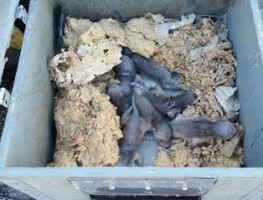This is the time of the year when homeowners are most likely to be dealing with wildlife in their homes. It is mating and birthing season for raccoons, squirrels skunks and more. Wildlife are looking for homes to house their babies.
When confronted with wildlife living up-close in their own homes or backyards, well-meaning but overwhelmed homeowners often resort to what they see as the most humane solution—live-trapping the animal and then setting them free in a far-away natural area.
Although homeowners mean well, wild animals do not “settle in” quickly to new surroundings, no matter how inviting that habitat may seem to humans. In fact, the odds are heavily stacked against any animal that is relocated in a strange park, woodland, or other natural area.
A study of grey squirrels that were live-trapped and relocated from suburban areas to a large forest showed that a staggering 97 percent of the squirrels either soon died or disappeared from their release area.
Here are other reasons you should not trap and relocate:
- Trapping wildlife creates orphans. There is always the potential you have trapped a mother that has a nest of babies somewhere.
- Baited traps attract more wildlife.
- Traps is that they don’t discriminate who they capture. Setting up a trap on the roof of your home or in the backyard could catch the animal in your attic, but it could also catch one of the other 15-25 raccoons, squirrels or skunks living in the neighborhood.
- It is incredibly stressful for a wild animal to be trapped and often they injure themselves trying to get out. Teeth and claws are often broken in the animal’s frantic effort to escape.
- Animals trapped and relocated in another location have no idea where the food and water sources are. This often leads to starvation and death. Studies done on raccoons that were relocated support this finding. The animal will typically die within 2 weeks of being relocated.
- Most likely you will be dumping this animal in the territory of another animal and this will lead to territorial disputes, and often these fights lead to serious injuries and death.
- If you capture a sick animal and transfer it to a healthy population, this spreads disease. Hamilton, ON residents who have been dealing with a rabies outbreak this fall will know that the virus has spread as a result of raccoons being trapped and relocated, making the outbreak worse.
- If you remove an animal out of its territory (by either trapping or killing) you have opened up a territory and another animal will soon show up to take its place.
- It doesn’t solve the problem. As long as the attractant remains (food, shelter or water) other animals will show up. Removing the source of what is attracting them, removing the appeal and sealing up any entry holes on the property is the solution.
- Under the Ontario Ministry of Natural Resources, Fish and Wildlife Conservation Act it is illegal to trap and relocate any wild animal beyond close proximity to the point of capture.
- Even if you could take the animal away, it simply would open up a space for another animal to move in and utilize the resources. Instead, figure out what is attracting the animal; remove the appealing area seal up the entry hole.
- A barricaded animal can cause a lot of damage trying to reunite themselves with their young, or trying to escape out.
- If you trap and relocate the mother, without removing the babies that may be hidden in the attic or crawl space, the babies will eventually starve to death and die. Terrible odors from the decaying bodies will fill your home.
Raccoons, squirrels and skunks begin giving birth to litters of babies in March and continue to give birth well into summer. Baby animals are not mobile for up to 10 weeks after birth; the only way to properly remove them from your attic is by hand.
The babies are often hidden in the attic in places hard to access, so it is important to have professionals who are trained in what to look for and how to handle the babies humanely in a way that will not hurt them handle the situation.
 Skedaddle Humane Wildlife Control uses a special heated ‘baby box’ to reunite the babies and mother. Once the babies and mother are out of the home our Wildlife Specialists will seal up all the entry areas in the home so that the animal cannot get back in.
Skedaddle Humane Wildlife Control uses a special heated ‘baby box’ to reunite the babies and mother. Once the babies and mother are out of the home our Wildlife Specialists will seal up all the entry areas in the home so that the animal cannot get back in.
Skedaddle Humane Wildlife Control has been dealing with wildlife, and their offspring for over 27 years. Our experience and commitment to humane treatment of animals ensure a happy outcome for both homeowner and animal family.
If you suspect that wildlife has taken up residence inside your attic, chimney, deck or shed then connect with Skedaddle today! Call 1-877-222-9453.
Proudly serving: Milton, Oakville, Burlington, Hamilton, Niagara Falls, Kitchener, Cambridge, Sudbury, Ottawa, Montreal, Halifax, Waterloo, Guelph, St. Catharines.


